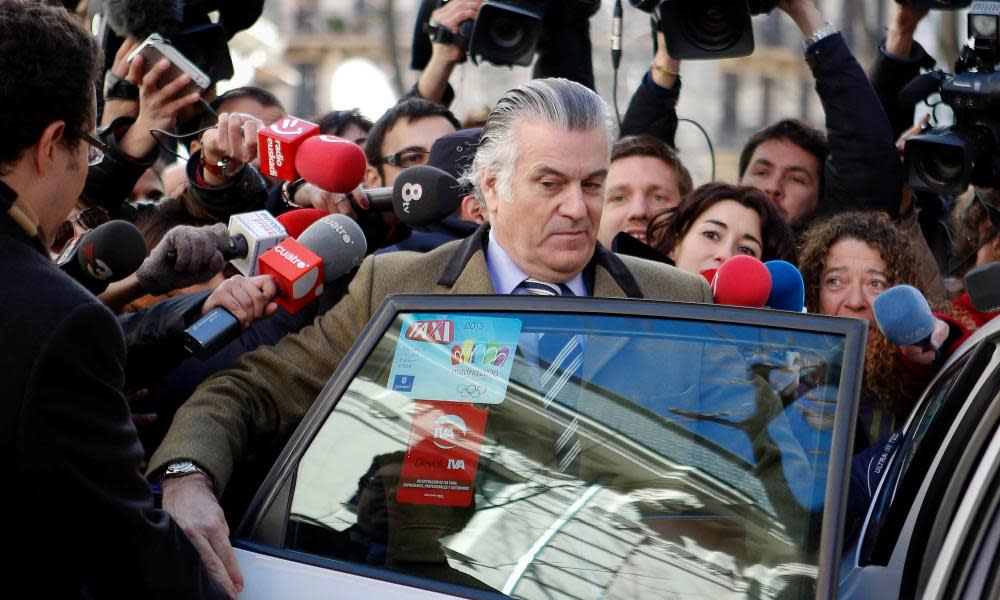Court finds Spain's ruling party benefited from bribery scheme

Spain’s ruling party has suffered a major blow after one of its former treasurers was jailed for 33 years for fraud and money laundering, and the party itself was found to have profited from an illegal kickbacks-for-contracts scheme, in a case that has become emblematic of political corruption in the country.
Luis Bárcenas, once a close ally of the prime minister, Mariano Rajoy, was sentenced to prison for his part in the conspiracy and fined €44m (£38.5m), while the People’s party (PP) was fined €240,000 after judges at Spain’s highest criminal court ruled that it had benefited from the racket.
The so-called Gürtel case centred on Francisco Correa, a businessman with close ties to the PP who was accused of paying bribes to party officials between 1999 and 2006 in return for contracts to carry out public works and organise events. The investigation was codenamed Gürtel, the German word for correa (belt).
Correa was sentenced to 51 years in prison, and his lieutenant Pablo Crespo was jailed for 37 years and six months. Bárcenas’s wife, Rosalía Iglesias, was jailed for 15 years, and Correa’s ex-wife, Carmen Rodríguez Quijano, for 14 years and eight months.
Iglesias’s sentence has prompted speculation that Bárcenas may now be prepared to divulge potentially damaging information about the PP’s internal finances.
In July last year Rajoy became the first serving Spanish premier to testify in a criminal case when he was called to give evidence to the Gürtel trial about his time as the PP’s vice-secretary general.
Rajoy said his duties during the period in question were exclusively political and not financial, and said suggestions that a slush fund was used to pay illegal bonuses to senior party officials were “absolutely false”.
In their ruling, the national court judges hearing the case confirmed the existence of a slush fund known as “box B”, describing it as “an accounting and finance structure that ran in parallel with the official one and which had been in use since at least 1989”.
Twenty-nine of the 37 defendants in the case were given prison sentences, while the remainder were acquitted.
The judges said Correa had created “an effective system of institutional corruption by manipulating the awarding of central, regional and local government contracts through his close and lasting relationship with influential members” of the PP.
They said these party members were able to “influence decisions made on the handing out of public contracts to certain public bodies and entities that they presided over or directly controlled through third parties”.
The PP said it would appeal against the decision to fine it, saying the party itself had not been on trial and pointing out that the penalty imposed was a civil rather than criminal one.
“The People’s party has shown, and will continue to show, its commitment to the fight against corruption and none of those sentenced today in this trial is still in the party,” it said. “No member of the current leadership or past leaderships has been charged in relation to this case. Some attended court as witnesses, which demonstrates that they had nothing whatsoever to do with [these] crimes.”
The socialist PSOE party called an emergency meeting of its executive committee for Friday morning, raising the prospect that it could move to hold a no-confidence vote in Rajoy.
The anti-austerity Podemos party renewed its calls for a motion of no-confidence. “Democracy can’t tolerate criminals in charge of government,” its leader, Pablo Iglesias, wrote on Twitter.
Albert Rivera, the leader of the centre-right Ciudadanos party, which is riding high in the polls and attracting disillusioned PP voters, said the court’s verdict “marks a before and an after in this legislature”.
He said it put Spain in a delicate position as it faced the challenge of Catalan separatism, and his party would take the necessary steps to make sure “our democracy isn’t damaged”.
When news of the scandal first emerged nine years ago, Rajoy dismissed it as “a plot against the PP”. He initially offered Bárcenas his support in a series of texts, telling his friend: “Luis, we are doing what we can” and “Luis, be strong”.
In the past few years, the PP has been increasingly mired in corruption scandals. In April the PP president of Madrid’s regional government resigned after accusations that she had faked her master’s degree and after video footage emerged of her apparently stealing face cream.

 Yahoo News
Yahoo News 